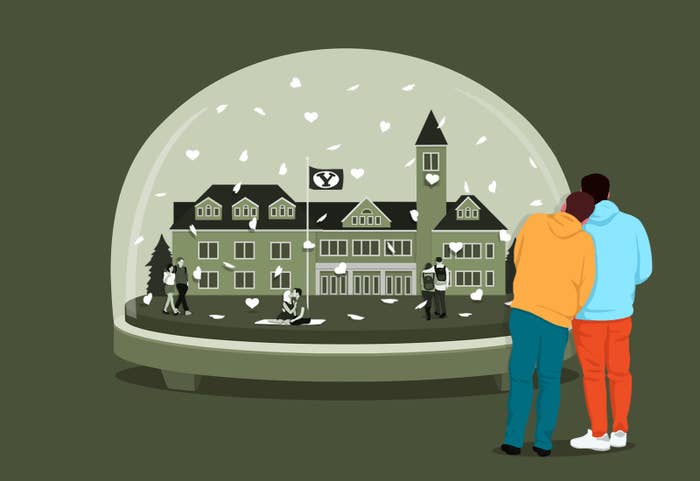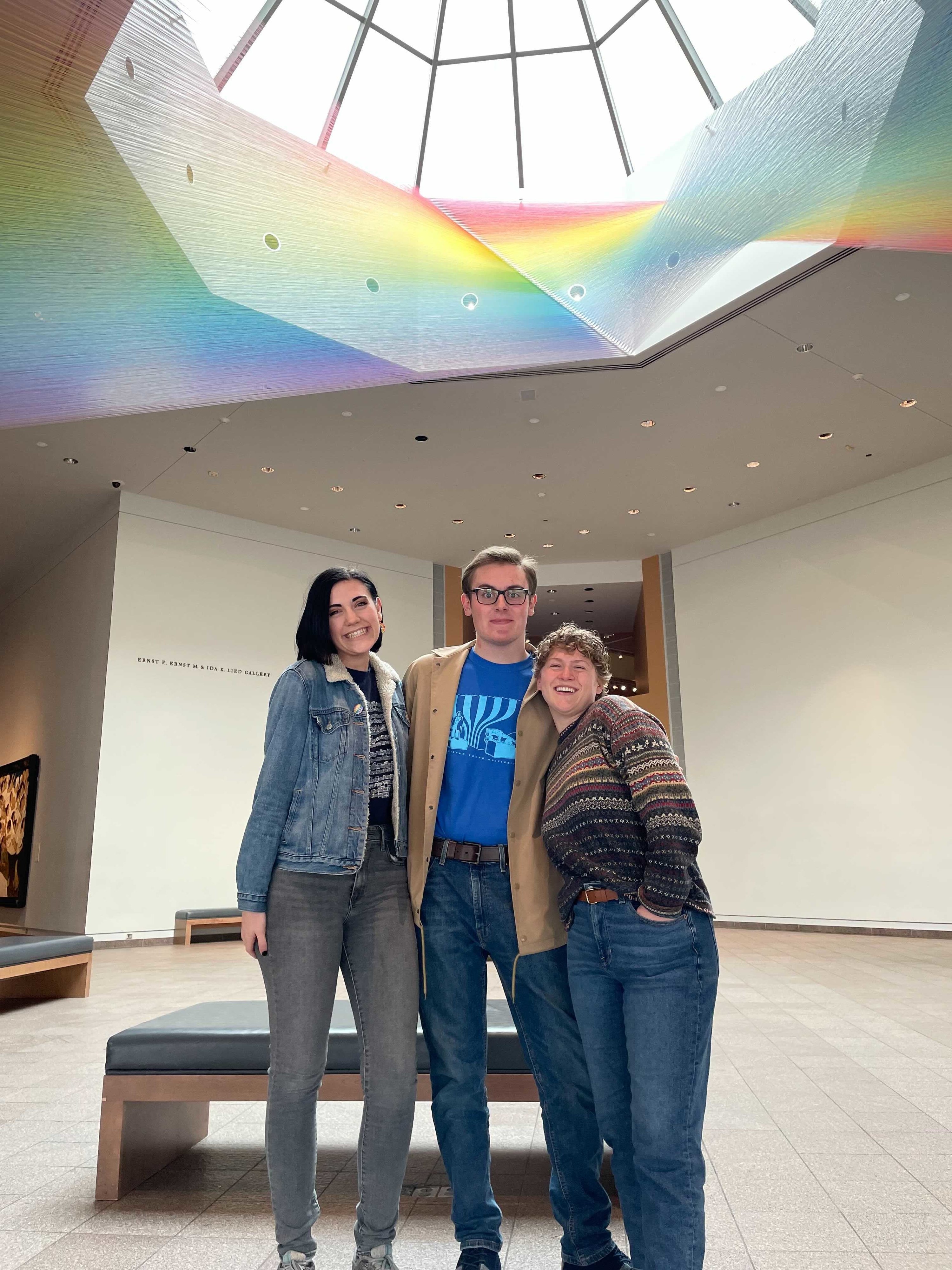
Finding “The One” is just part of the culture at Brigham Young University, where many members of the overwhelmingly Mormon student body meet the person they’ll spend their life with and, they believe, the afterlife, too. Relationships are so much a part of campus life that one biology professor offered his class extra credit last year if they went on a date.
The assignment was eventually changed when Luke Westhoff, a first-year chemistry major who is gay, told the professor he couldn’t participate because of BYU’s rules, which prohibit LGBTQ students from dating one another.
“That’s just the reality at BYU,” Westhoff told BuzzFeed News.
At BYU, which is owned by the Church of Jesus Christ of Latter-day Saints, LGBTQ students are allowed to be open about their identities but not to date students of the same sex. The honor code instructs students to “encourage others” to comply with the school rules, which many students interpret as encouraging them to report rule violators to the administration. Punishment for code violations can sometimes result in suspension or being kicked out of school. In spite of federal law that prohibits discriminating against students based on their gender or sexual orientation, BYU and other religious colleges and universities are exempt. Last week, the federal government affirmed that exemption when it dropped its investigation into a complaint about BYU’s dating policy and how it treats its queer students. The Department of Education’s Office for Civil Rights cited religious freedom, leaving queer students anxious about what will happen to their rights next.
In April 2021, about 30 students of religious colleges sued the Department of Education, asking that the religious exemption that allows the schools to discriminate against LGBTQ students be deemed unconstitutional.

The Department of Education then opened the investigation into BYU’s dating ban in October 2021. David Shill, a junior civil and environmental engineering major who cofounded the Cougar Pride Center to “celebrate progress and empower queer BYU students,” said he believed having the investigation in the background led the university to be more accommodating to queer students, creating what felt like a “golden age” at BYU. But the same day the investigation was dropped, BYU terminated gender-affirming voice therapy at its campus speech clinic for trans students, escalating some queer students’ fears for their future. The news upset Shill so much that he didn’t attend classes for the day. A BYU spokesperson said it is “completely inaccurate” that voice therapy, which helps transgender people relearn vocal pitch and intonations to better affirm their gender, was terminated because the investigation had been dropped.
“It is scary to think about what could happen next now that BYU isn’t scared about this looming investigation,” Shill, who is bisexual, told BuzzFeed News.
At BYU, student life is governed by an honor code based on LDS principles, covering issues from personal grooming to drinking coffee to sex. Not only does the honor code state that sexual relationships should be between a man and a woman — and only within marriage — but it also says that students should encourage one another in their “commitment to comply with the Honor Code,” introducing what some call a culture of tattletales. For queer students in relationships, they have to date where no one can find them.
BYU, and the LDS church more generally, “idolizes relationships,” Westhoff said, framing entering into a heterosexual marriage as one of the chief “goals” of the faith. But as a gay man, Westhoff is barred from achieving that goal, making him feel “stunted” and “cheated” by his university.
“[They’re] two-faced because they say, ‘Go get in a relationship — oh, but not that relationship,’” he said. “It makes you feel hopeless and envious, which I hate. I hate that I feel envious when I see straight people at my university. That is not something that is inherent of being queer; that’s just because BYU has made it feel that way because I physically am not allowed to try and do the same things. So I’ve grown envious of people.”
One queer student, who asked to be anonymous for fear of repercussions at BYU, told BuzzFeed News that he and his boyfriend, who is also a BYU student, see each other on campus but refrain from public displays of affection. While his close friends know about his relationship, he and his boyfriend wait until they’re away from campus to hold hands and go on walks around Provo, the Utah city that is home to BYU. Seeing his straight peers do the same thing on a campus that culturally revolves around heterosexual relationships makes him feel “left out.”
“We never count when it comes to love,” the student said. “Our love doesn’t count. Seeing PDA on campus is just annoying.” “You don’t know how much you have,” he added, indirectly addressing the straight students. “You don’t even know your privilege.”
Growing up going to church, he said he was always “conditioned” to eventually attend BYU. He thought his attraction to men would go away, but it didn’t. He has stayed at the university despite wanting to transfer. Up until he started dating his boyfriend, he was even considering getting his master’s degree at BYU, especially because the university would fully fund it. But he has now realized he can’t stomach another year of hiding, forcing him to choose his mental health over academic opportunities.
“I’m just sick of lying,” he said.
Mariane Rizzuto, a junior English teaching major at BYU who is bisexual, said the informant culture is so powerful that when she applied to study abroad, university staff asked her multiple times what she would do if she saw another BYU student breaking the school’s rules. Rizzuto felt like if she didn’t say she would turn them in, she wouldn’t be approved for study abroad. A BYU spokesperson pointed BuzzFeed News to a 2019 BYU magazine article in which Kevin Utt, the director of the honor code office, said there is no requirement for students to report classmates or a penalty for those who don’t.

Rizzuto also said that BYU students are required to take its “Eternal Family” class. It teaches “the doctrine of the family,” which is the church’s teaching that “God created a man and a woman who were the two essential halves of a family.” The class includes lessons like “Spousal Stewardships (Unity): Divine Gender and Meeting the Needs of Children” and “The Fragmentation of Marriage: Same-Sex Marriage, Sexual Identity, and Sexual Agency.” Rizzuto said her teacher tried her best to be inclusive of LGBTQ relationships, but that the curriculum required by the school made that mission almost impossible. Because of this, the class traumatized Rizzuto. Comments from her classmates made her feel like an “other,” so much so that during the first two weeks, she said she left crying every time.
“It’s just hard, even when the professor is doing their best, to sit week after week in a class that’s core curriculum is about teaching you why it’s wrong to be yourself,” she said. “It’s something that just brings up a lot of trauma and hard feelings.”
Julia Sasine, a senior sociology major who identifies as a lesbian, queer woman, said she was once reported for violating the honor code, for a reason unrelated to her queerness, and that the fallout was “the most traumatic part” of her time at BYU. The university’s anti-LGBTQ culture and fear tactics can make even the closest friends turn on one another, Sasine added, pointing out that it was her then–best friend who turned her in. Since then, she hasn’t been able to trust anyone.
Sasine declined to disclose what got her sent to the honor code office, but she said it resulted in her being placed on a year’s probation, which included “steps of rehabilitation and adherence to the honor code standings”: writing an essay based on the tenets of the honor code, attending weekly university forums and devotionals, studying religious materials, daily journaling, and attending presentations from church leaders. She said she met alone with honor code counselors, whom she described as adult men “who had no professional counseling or therapy credentials but who acted on giving behavioral and emotional advice.”
In a statement to BuzzFeed News, a BYU spokesperson said that the honor code staff goes through “ongoing training on important topics, such as trauma and sexual assault.”
“The staff has also completed trainings by Counseling and Psychological Services including in QPR (Question, Persuade and Refer), recognizing signs of suicidal ideation,” according to the statement. “Additional trainings also include trauma-informed care, DEI (diversity, equity, and inclusion), addiction, mental health, and other relevant topics. The members of the HCO staff also come with a wide variety of experience, background, and training in working with students.”
Sasine said that to this day, she refuses to walk anywhere near the honor code office. She tries her best not to do anything that would get her sent back, including being in a queer relationship.
“The entire experience was extremely traumatizing,” she said. “From being betrayed by my best friend, to being blindly interrogated with no representation or advocate on my side, I learned quickly that surviving at BYU was going to be extremely difficult, and that thriving was out of the question. I built up an extremely tough exterior while battling anxiety, PTSD, and intense, all-consuming shame.”
BYU’s ban on dating is part of a long history of churches treating LGBTQ people as sinners and outcasts, said Paul Carlos Southwick, the director of the Religious Exemption Accountability Project and the lawyer who represented the LGBTQ students in the federal lawsuit. Southwick told BuzzFeed News in a statement that the investigation into BYU being dropped recently is just another example of the government siding with discrimination.
“By dismissing this investigation, the federal government has not only dashed the hopes of many LGBTQ+ students who saw the investigation as a sign of good things to come, but it has placed the government’s stamp of approval on BYU’s discriminatory practices, which the government not only funds, but has now formally handed out a license to discriminate,” Southwick said.
Even though the investigation was dismissed, some students still wanted to keep fighting for their school’s queer classmates and figure out what actions they could take to show their pride. The gay student who asked to be anonymous decided to call on the local LGBTQ community for help. He came up with the idea for a love-based protest, made a graphic, and sent it around to as many people as he could think of. It worked.
On Valentine’s Day, about a week after the investigation was dropped, more than 100 people, none of whom were BYU students, walked onto campus and performed queer public displays of affection. They were local LGBTQ activists, BYU grads, and members of the nearby queer community who had seen the post and wanted to show solidarity. They held hands and kissed in broad daylight in the middle of campus. Others wore clothes that illustrated their pride, like a sweatshirt portraying art by Keith Haring, a gay graffiti artist from the 1980s famous for his protest art against the government’s treatment of the HIV/AIDS crisis. The protesters stood in for the LGBTQ BYU students on campus, hoping to help them feel a little less alone. No arrests were made, the demonstrators said on social media, but campus security stood nearby.
“Emotions were definitely near the surface for me all day,” Shill said. “Seeing couples reminded me that that will be me one day. Me and my future husband will be able to live a real life and thrive. For now, I just need to work for that. It will be all that more worth it.”
It was the latest sign that some LGBTQ students at the university are tired of living in fear. The student who asked to remain anonymous said he does everything to protect himself while dating another man, but he is starting to feel less scared. In fact, he said, he might be ready to fight back.
“I’m just so used to being oppressed that I’m like, I am going to operate right now in a way that is the most authentic and in the happiest way,” he said. “At Stonewall, they fought back for the first time because they were so sick of it. I’m just sick of it.” ●
